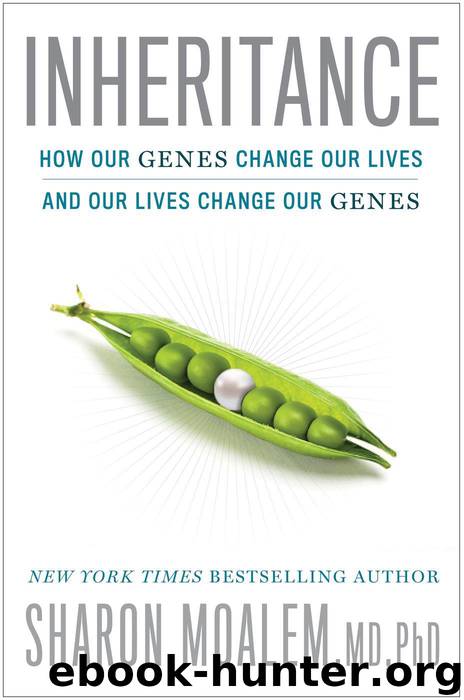Inheritance: How Our Genes Change Our Lives--and Our Lives Change Our Genes by Sharon Moalem

Author:Sharon Moalem
Language: eng
Format: mobi
Publisher: Grand Central Publishing
Published: 2014-04-15T00:00:00+00:00
Chapter 7
Picking Sides
How Genes Help Us Decide Between Left and Right
The raging bull was done. He’d been put out to pasture. That’s what they said.
And it wasn’t just the critics—although there were many of those too. It was fellow surfers. They’d known for a long time that Mark Occhilupo’s demons were getting the best of him. They knew the drugs had taken their toll. They could see him getting bigger around the waist and falling further and further behind the other top surfers of the day.
In 1992, it all came to an explosive apogee. At the Rip Curl Pro competition on southeast France’s famed Hossegor Beach, the man known around the world as Occy reportedly attempted to push over the judges’ booth, threw a board at his opponent, and even chowed down on some beach sand before announcing he would be swimming home to Australia.1
The self-assured, swaggering Aussie had never won a world title. And when Occhilupo abandoned the Association of Surfing Professionals championship tour that year, it seemed clear he never would.
Out of the limelight, though, Occy set to work righting his life. He got sober. Got back into shape. He swore off the fried chicken, which had been a staple of his diet for way too long. He started surfing again, this time for fun and fitness rather than fame and financial gain.
Then in 1999 Occhilupo grinded his way, wave by wave, win by win, to the Association of Surfing Professionals World Tour Title. At 33, he was the oldest champion ever.
Years later, Occy was still at it. After yet another retirement—this one came about on easier terms than the first—the raging bull was raring for another shot at the world circuit. It was then, on a stunning Hawaiian morning on the island of Oahu, that I watched Occhilupo dive headfirst into the crashing waves, emerging not long afterward over the frothy crest and dropping into the trough with all the effort that any of the rest of us might put into laughing at a great joke.
I’m not a pro surfer, but one thing really stood out to me as I watched Occhilupo ply his trade that day: He’s goofy.
Some people call left-handers southpaws. Others call them mollydookers or corky dobbers. Scientists still often call lefties sinister, which in Latin originally just meant “left” but later came to be associated with evil.2
Wondering about the medical implications of being born a corky dobber? It may surprise you that left-handed women were found to be twice or more likely to develop premenopausal breast cancer than right-handers. And a few researchers believe this effect may be linked to exposure to certain chemicals in utero, affecting your genes and then setting the stage for both left-handedness and cancer susceptibility,3 thus opening up another probability of nurture changing nature.
When it comes to our hands, feet, and even our eyes, most human beings are right-side dominant. Now, you might think that footedness and handedness are always aligned, but as it turns out that’s not always the case for right-handed people, and it’s even more infrequent for left-handed people.
Download
This site does not store any files on its server. We only index and link to content provided by other sites. Please contact the content providers to delete copyright contents if any and email us, we'll remove relevant links or contents immediately.
Sapiens: A Brief History of Humankind by Yuval Noah Harari(14391)
Sapiens by Yuval Noah Harari(5372)
Pale Blue Dot by Carl Sagan(5010)
Homo Deus: A Brief History of Tomorrow by Yuval Noah Harari(4919)
Livewired by David Eagleman(3775)
Origin Story: A Big History of Everything by David Christian(3692)
Brief Answers to the Big Questions by Stephen Hawking(3436)
Inferior by Angela Saini(3316)
Origin Story by David Christian(3202)
Signature in the Cell: DNA and the Evidence for Intelligent Design by Stephen C. Meyer(3139)
The Gene: An Intimate History by Siddhartha Mukherjee(3099)
The Evolution of Beauty by Richard O. Prum(3000)
Aliens by Jim Al-Khalili(2830)
How The Mind Works by Steven Pinker(2816)
A Short History of Nearly Everything by Bryson Bill(2699)
Sex at Dawn: The Prehistoric Origins of Modern Sexuality by Ryan Christopher(2530)
From Bacteria to Bach and Back by Daniel C. Dennett(2485)
Endless Forms Most Beautiful by Sean B. Carroll(2483)
Who We Are and How We Got Here by David Reich(2437)
